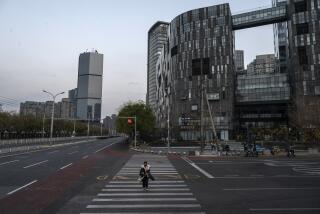China’s ‘Stick Army’ Moves to Cities in Quest for Work : Asia: Chongqing, a hilly city with steep stairs, is inviting to hordes of job seekers. The migrant porters live simply and send their pay home to support their families.
CHONGQING, China — Outside a neighborhood grain shop, men in dark blue cotton jackets stand on the sidewalk holding long bamboo poles, waiting for shoppers to hire them to carry heavy bags of rice.
In Chongqing, the biggest city in southwestern China, these men who migrate from the countryside looking for work are known as the “stick army.”
Balancing loads suspended from the ends of 5-foot poles across their shoulders, stick men haul whatever needs moving--blue plate-glass for high-rise buildings, boxes of bananas from wholesale markets, rolls of plastic roofing, suitcases bound for tour boats on the Yangtze River.
This traditional form of labor in China is no longer seen in wealthier, more sophisticated Beijing, the national capital, but it is everywhere in Chongqing, an industrial city in Sichuan province.
Beijing is flat, with streets jammed with traffic and millions of bicycles. For those who do not have access to a truck, a three-wheeled, pedal-powered flat-bed cart is a lower-cost alternative for hauling heavy goods.
Chongqing is a city of hills where few people bike. Its steep stair paths are resting places for stick men in their teens to 40s who wander the streets with shoulder poles looking for work.
“Anybody can do this,” said Zhang Jianchang, tapping his stick as he stood leaning on it and smoking a cigarette outside the Xuetianwan grain shop.
Zhang, 42, supports his wife, mother and two young sons in Guang’an county, senior leader Deng Xiaoping’s childhood home. Per capita income in Guang’an is 610 yuan ($73) a year, which is one-third less than the provincial average for farmers.
Zhang takes a five-hour bus trip home to help farm during four peak months, growing crops for the family’s use. The rest of the year he earns the family’s only cash income--about 600 to 700 yuan ($70-$85) a month--carrying loads in Chongqing.
Many of the younger men go to richer cities on the coast, like Shanghai or Canton, where they hope to find big money, Zhang said.
He found work fairly steady in Chongqing, but competition for it has become one of his biggest problems.
More and more men are looking for jobs in Chongqing, and there is no organization--not even a line at work sites. The customer or boss chooses laborers, and the rest wait or look elsewhere.
The porters live simply and send their pay home to support their families. Zhang said he spends about 10% of his earnings to rent a room with about 10 other men. He had few complaints.
“I’m here to make money so my boys can stay in school,” he said.
Police do not bother him, he said, because he has registered with the government and pays about 2% of his earnings in taxes.
The porters of Chongqing are part of China’s “floating population” of 80 million farmers who have moved to the cities to find jobs because they no longer have enough work in farming.
China’s farmland is shrinking due to development and the pressure of population growth. Meantime, production costs in farming have gone up, making it increasingly unattractive.
For those who migrate to the cities, construction projects are a major source of jobs. Other migrants run vegetable stands, sort garbage and sweep streets. Chinese cities like Beijing, with more than 3 million migrants, have grown to depend on them.
But officials also say migrants contribute to rising crime rates and overcrowding. Beijing has begun requiring migrants to get working papers in an effort to prevent any further increase in their numbers.
Chongqing so far has no plan to slow the flow of labor from the countryside. Officials have no estimate of the migrant population, but say the numbers are growing. Sichuan’s population of 112 million includes 20 million idle laborers.
Perhaps the only check on an even greater influx from the countryside is the higher cost of living in the cities.
But Zhang said paying more for the rice he eats was no problem.
“Many farmers have nothing to do in the fields,” he said.
More to Read
Sign up for Essential California
The most important California stories and recommendations in your inbox every morning.
You may occasionally receive promotional content from the Los Angeles Times.









